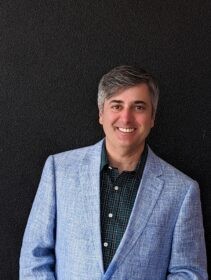Finding hope in a precarious place
By Ned Randolph, author of Muddy Thinking in the Mississippi River Delta: A Call for Reclamation
My wife Jessica calls New Orleans the land of misfit toys.
While rising insurance rates reflect the challenges of engineering away from danger, we are drawn to something more powerful than a hurricane: a fierce cultural persistence for breaking bread in the ruins.

I spent some time thinking about this for my recent book, Muddy Thinking in the Mississippi River Delta: A Call for Reclamation.
To be sure, the city’s aging drainage system and subsiding coastal protection against more powerful storms should give one cause for concern.
The question is how we choose to respond. I like filmmaker Josh Fox’s argument for longer tables.
Fox recently erected a thousand-foot-long “welcome table” on the Mississippi River levee for climate activists, artists and globally displaced people to showcase our shared humanity.
“We are all going to be in the position of either having to move or having to welcome somebody,” he said at the Bywater event, which culminated filming for his HBO project.
“As the saying goes, if you have more than you need, don’t build a higher wall, build a longer table,” he said.
In the book "Unfathomable City: A New Orleans Atlas," Rebecca Solnit discusses our soft, shifting landscape as a cartographical problem, often described by its mushy terrain: a city that is “fluid,” “spongy” or “deceptive.”
We reside on a ridge of mud deposited by the Mississippi River, which at flood stage towers over rooftops. But the more we levee, dredge and drill, the higher the water rises.
A new Prometheus was unleashed last year when the Army Corps of Engineers deepened the Mississippi to 50 feet to accommodate new “supermax” ships. A saltwater wedge, enabled by the deepened riverbed and upstream drought conditions, began creeping towards New Orleans.
“The Wedge” caused a run on bottled water. My wife on conference calls with Tulane Medical Center was advised to start filling up old water bottles as a precaution.
The Corps constructed a sill across the riverbed to hinder its advancement. After two months, the danger had abated. The Wedge, like those British Warships, was halted at English Turn.
But we still have the box of wine bottles filled with drinking water in the closet ... because you never know.
Like many, my neighbor on Facebook wondered whether it was time to leave New Orleans. Dysfunctional governance takes its toll. This is a serious problem that might come for us all. But until then, the culture here offers something unique.
When Jessica returned from a medical conference in San Diego, where we moved for her residency, she was reminded of how clean and functional the city is. “But it’s not New Orleans,” she said.
We often play host to guests coming to dip their toe in the deep culture of the city. But they leave us to continue the march.
And we do. We walk in Krewe Du Vieux and second line through the Quarter on Fat Tuesday. We find reason to mingle for crawfish boils, pickle ball and seasonal block parties. After a good meal, we take in the early energy of Frenchmen Street before relieving the babysitter.
We seek kinship in those willing to embrace this urban throwback of fax machines and incoherent bureaucracy. When City Hall fell victim to a cyberattack in 2019, little seemed to change and no one bothered to update us when, or if, the city recovered.
Traffic takes its own course as Mardi Gras parades lock down an entire portion of the city “in the box.” Businesses close early for Saints games. Clogged catch basins and failed power sources are blamed for wildly unpredictable flooding.
We trade functionality for something more informal, yet perhaps more secure: community and friends that are with you.
Back at the Music Box Village in the Bywater, several hundred people were readying to make their way up to the Welcome Table. There was drumming, dancing and Carnival marionettes. The atmosphere was downright jubilant. And why not?
“When I moved to New Orleans, people said to me, ‘What, are you crazy?’” said Fox, a New York City transplant. “’There’s sea level rise and hurricanes. Do you know how dangerous that’s going to be?’ Well now everywhere is New Orleans. So, you might as well be here because it’s better.”
That’s a table I’m still willing to join.
This essay was originally published on Nola.com.
